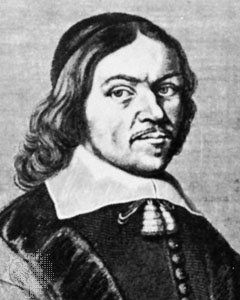<Back to Index>
- Philosopher Johannes Clauberg, 1622
- Painter Franz Stuck, 1863
- Naval Commander John of Austria, 1547
PAGE SPONSOR

Johannes Clauberg (24 February 1622 – 31 January 1665) was a German theologian and philosopher. Clauberg was the founding Rector of the first University of Duisburg, where he taught from 1655 to 1665. He is known as a "scholastic cartesian".
He was born in Solingen, Germany, and educated in the Aristotelian tradition in Köln, Moers and Bremen, then in Gröningen, where he discovered what came to be called the reformed variation of Aristotelianism. He gave his first disputations in Gröningen under the supervision of Tobias Andreae. His first treatise in metaphysics was written in those student years: Elementa philosophiae sive Ontosophia (1647). Travelling in France and England, he came to study the Cartesian philosophy under Johannes de Raey at Leiden. In 1649, he became professor of philosophy and theology at Herborn, but subsequently (1651), in consequence of the jealousy of his colleagues, accepted an invitation to a similar post at Duisburg.
Clauberg was one of the earliest teachers of the new doctrines in Germany and an exact and methodical commentator on his masters writings. His theory of the connection between the soul and the body is in some respects analogous to that of Malebranche; but he is not therefore to be regarded as a true forerunner of Occasionalism, as he uses Occasion for the stimulus which directly produces a mental phenomenon, without postulating the intervention of God. His view of the relation of God to his creatures is held to foreshadow the pantheism of Spinoza. All creatures exist only through the continuous creative energy of the Divine Being, and are no more independent of his will than are our thoughts independent of us, or rather less, for there are thoughts which force themselves upon us whether we will or not.
Metaphysics, in Clauberg's conception, studies not the being (ens), but the intelligible, as in the most general object of the intellect (ens cogitabile). The most high concept is not being, but the object in general as known to the intellect. For metaphysics Clauberg suggested the names ontosophy or ontology, the latter being afterwards adopted by Wolff. In the prolegomena to his Elementa philosophiae sive Ontosophiae (1647), Clauberg says:
| “ | Since the science which is about God calls itself Theosophy or Theology, it would seem fitting to call Ontosophy or Ontology that science which does not deal with this and that being, as distinct from the others owing to its special name or properties, but with being in general. | ” |
Étienne Gilson writes:
| “ | This text may be held, in the present state of historical knowledge, for the birth certificate of ontology as a science conceived after the pattern of theology, yet radically distinct from it, since being qua being is held there as indifferent to all its conceivable determinations. 'There is, Clauberg says, a certain science which envisages being inasmuch as it is being, that is, inasmuch as it is understood to have a certain common nature or degree of being, a degree which is to be found in both corporeal and incorporeal beings, in God and in creatures, in each and every singular being according to its own mode.' Leibniz will later praise Clauberg for such an undertaking, but he will regret that it had not been a more successful one. The very word "ontology" occurs at least once in an undated fragment of Leibniz, and one can expect accidentally to meet it later in various places, but it is not until 1729 that it finally comes into its own with the Ontologia of Christian Wolff." | ” |
Clauberg died in Duisburg, and lies buried in the city's cathedral.